李白诗歌英文翻译(最新)
经典古诗英文翻译

经典(jīngdiǎn)古诗英文翻译经典(jīngdiǎn)古诗英文翻译《小池》杨万里泉眼(quányǎn)无声惜细流(xì liú),树阴照水爱晴柔。
小荷才露尖尖角,早有蜻蜓(qīngtíng)立上头。
A Small PondYang WanliFrom fountainheads water streaks out thin and quiet. Soft and Sunny are trees reflected in the pond.A slim lotus leaf, not yet unfurled, scarcely appears When on its pointed tip a dragonfly is alighted.《黄鹤楼送孟浩然之广陵(ɡuǎnɡ línɡ)》李白故人(gùrén)西辞黄鹤楼,烟花三月下扬州。
孤帆远影碧空尽,唯见长江天际流。
Seeing Meng Haoran Off from Yellow Crane TowerLi BaiAt Yellow Crane Tower in the westMy old friend says farewell;In the mist and flowers of springHe goes down to Yangzhou;Lonely sail, distant shadow,Vanish in blue emptiness;All I see is the great riverFlowing into the far horizon.《春晓》孟浩然春眠不觉晓,处处闻啼鸟。
夜来风雨声,花落知多少。
Spring MornSpring slumbers unaware of morn,All around one hears the birds' call.Last night, the sound of wind and rain,How many fallen flowers accounted for?朱熹《春日》胜日寻芳泗水滨,无边光景一时新。
李白诗白日依山尽黄河入海流中英文对照

李白诗白日依山尽黄河入海流中英文对照摘要:I.简介- 介绍李白和这首诗的背景II.诗的原文及翻译- 中文原文- 英文翻译III.诗的意境和主题- 分析诗的意境和主题- 介绍诗中的自然景观和诗人情感IV.诗的语言和艺术特点- 分析诗的语言和艺术特点- 介绍诗的韵律和修辞手法V.结论- 总结诗的意义和价值- 强调这首诗在文学史上的地位正文:I.简介李白(701-762),字太白,号青莲居士,唐代著名诗人,被尊称为“诗仙”。
他的诗歌以豪放、奔放、清新、高远著称,具有很高的艺术价值和历史地位。
今天,我们将要探讨的是他的代表作之一——《将进酒》中的一句诗:“白日依山尽,黄河入海流。
”II.诗的原文及翻译【中文原文】白日依山尽,黄河入海流。
欲穷千里目,更上一层楼。
【英文翻译】The white sun sets behind the mountains,The Yellow River flows into the sea.To see the end of a thousand miles,One must climb one more floor.III.诗的意境和主题这首诗通过描绘自然景观,表达了诗人豪情壮志、胸怀天下的情感。
诗中的“白日依山尽”描绘了夕阳西下,阳光逐渐消失在山峦之间的美景,而“黄河入海流”则展示了母亲河在历经千辛万苦后,最终汇入大海的壮观景象。
诗人借助这些自然景观,抒发了自己对世界的探索精神和对未来的无限憧憬。
IV.诗的语言和艺术特点这首诗的语言简练、意境高远,充满了豪放不羁的气息。
诗中运用了大量的对仗和押韵,如“白日依山尽”与“黄河入海流”之间的对仗,以及每句诗的末尾字“尽”、“流”之间的押韵,使得整首诗在形式上和谐统一。
此外,诗中还运用了夸张手法,如“欲穷千里目,更上一层楼”,表达了诗人敢于挑战、勇攀高峰的精神。
V.结论总之,李白的这首诗以其独特的意境、优美的语言和深刻的思想内涵,成为了中国古代诗歌的瑰宝。
《赠汪伦》英文翻译及赏析
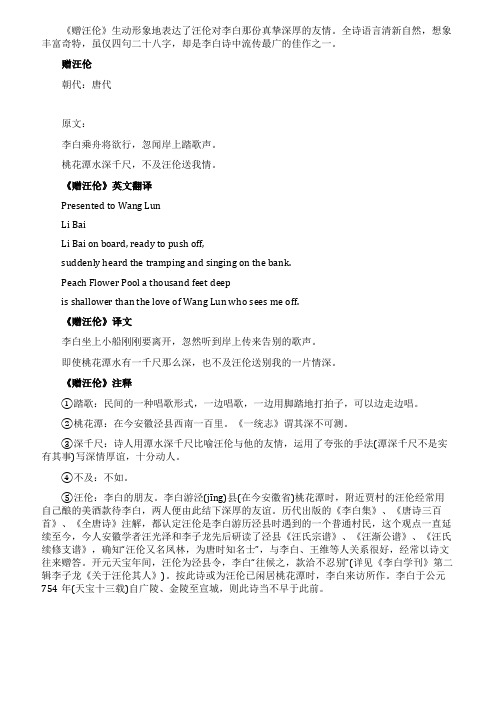
《赠汪伦》生动形象地表达了汪伦对李白那份真挚深厚的友情。
全诗语言清新自然,想象丰富奇特,虽仅四句二十八字,却是李白诗中流传最广的佳作之一。
赠汪伦朝代:唐代原文:李白乘舟将欲行,忽闻岸上踏歌声。
桃花潭水深千尺,不及汪伦送我情。
《赠汪伦》英文翻译Presented to Wang LunLi BaiLi Bai on board, ready to push off,suddenly heard the tramping and singing on the bank.Peach Flower Pool a thousand feet deepis shallower than the love of Wang Lun who sees me off.《赠汪伦》译文李白坐上小船刚刚要离开,忽然听到岸上传来告别的歌声。
即使桃花潭水有一千尺那么深,也不及汪伦送别我的一片情深。
《赠汪伦》注释①踏歌:民间的一种唱歌形式,一边唱歌,一边用脚踏地打拍子,可以边走边唱。
②桃花潭:在今安徽泾县西南一百里。
《一统志》谓其深不可测。
③深千尺:诗人用潭水深千尺比喻汪伦与他的友情,运用了夸张的手法(潭深千尺不是实有其事)写深情厚谊,十分动人。
④不及:不如。
⑤汪伦:李白的朋友。
李白游泾(jīng)县(在今安徽省)桃花潭时,附近贾村的汪伦经常用自己酿的美酒款待李白,两人便由此结下深厚的友谊。
历代出版的《李白集》、《唐诗三百首》、《全唐诗》注解,都认定汪伦是李白游历泾县时遇到的一个普通村民,这个观点一直延续至今,今人安徽学者汪光泽和李子龙先后研读了泾县《汪氏宗谱》、《汪渐公谱》、《汪氏续修支谱》,确知“汪伦又名凤林,为唐时知名士”,与李白、王维等人关系很好,经常以诗文往来赠答。
开元天宝年间,汪伦为泾县令,李白“往候之,款洽不忍别”(详见《李白学刊》第二辑李子龙《关于汪伦其人》)。
按此诗或为汪伦已闲居桃花潭时,李白来访所作。
李白于公元754年(天宝十三载)自广陵、金陵至宣城,则此诗当不早于此前。
李白将进酒英文翻译
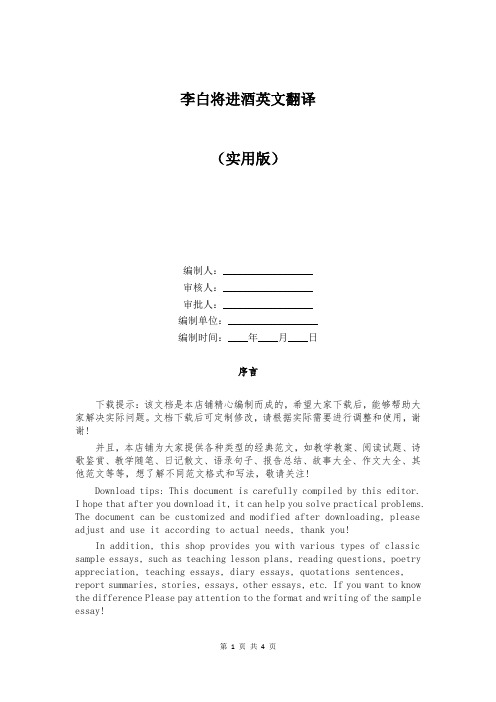
李白将进酒英文翻译(实用版)编制人:__________________审核人:__________________审批人:__________________编制单位:__________________编制时间:____年____月____日序言下载提示:该文档是本店铺精心编制而成的,希望大家下载后,能够帮助大家解决实际问题。
文档下载后可定制修改,请根据实际需要进行调整和使用,谢谢!并且,本店铺为大家提供各种类型的经典范文,如教学教案、阅读试题、诗歌鉴赏、教学随笔、日记散文、语录句子、报告总结、故事大全、作文大全、其他范文等等,想了解不同范文格式和写法,敬请关注!Download tips: This document is carefully compiled by this editor.I hope that after you download it, it can help you solve practical problems. The document can be customized and modified after downloading, please adjust and use it according to actual needs, thank you!In addition, this shop provides you with various types of classic sample essays, such as teaching lesson plans, reading questions, poetry appreciation, teaching essays, diary essays, quotations sentences, report summaries, stories, essays, other essays, etc. If you want to know the difference Please pay attention to the format and writing of the sample essay!李白将进酒英文翻译李白将进酒英文翻译导语:《将进酒》这首诗用三言、五言、七言句法错杂结构而成,一气奔注,音节极其急促,表现了作者牢骚愤慨的`情绪。
李白 将 进 酒(附翻译和英文翻译以及赏析)
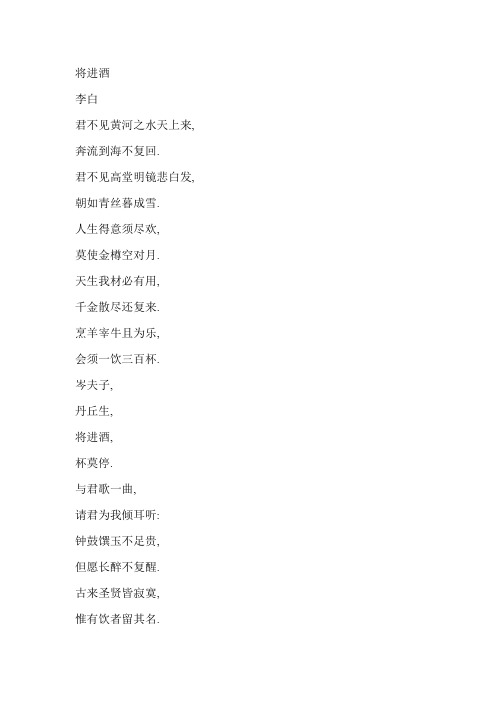
将进酒李白君不见黄河之水天上来, 奔流到海不复回.君不见高堂明镜悲白发, 朝如青丝暮成雪.人生得意须尽欢,莫使金樽空对月.天生我材必有用,千金散尽还复来.烹羊宰牛且为乐,会须一饮三百杯.岑夫子,丹丘生,将进酒,杯莫停.与君歌一曲,请君为我倾耳听:钟鼓馔玉不足贵,但愿长醉不复醒.古来圣贤皆寂寞,惟有饮者留其名.陈王昔时宴平乐,斗酒十千恣欢谑.主人何为言少钱,径须沽取对君酌.五花马,千金裘,呼儿将出换美酒,与尔同销万古愁.写作背景《将进酒》是汉乐府旧题,李白这首诗虽用了旧题,却能跳出前人窠臼,自创新意,把饮酒和对黑暗现实的批判结合起来.这首诗是一首劝酒歌,大约作于唐玄宗天宝十一年,即安史之乱前四五年光景.当时唐玄宗耽于女色,先后将政事交给奸相李林甫和杨国忠,官场一片黑暗,豪门贵族只顾寻欢作乐,不以国事为念,社会腐败到了无以复加的地步.诗人对此极为不满,但他又无力改变这种状况,只能用消极的办法进行反抗,借酒销愁,"但愿长醉不复醒."诗人借题发挥,尽吐郁积在胸中的不平之气,这种反抗方式,跟《梦游天姥吟留别》中借寻仙表现不事权贵的意志的写法颇为相似.鉴赏要点1,感情上大起大落这首诗中,诗人感情的发展变化极快,可分四个层次开头四句写悲.一落笔就写黄河景象,有慷慨生悲之意.这是非同寻常的.诗人写黄河,颇能显示它的宏伟气魄和浩大声势,如"黄河如丝天际来""洪波奔流射东海"(《西岳云台歌送丹丘子》),"黄河西来决昆仑,咆哮万里触龙门"(《公无渡河》)等,其基调是壮;这次则不同——诗人仿佛站在高山之巅,顷刻间就看遍了它的万里流程,因有"不复回"之叹,尽管也写出了黄河的气魄之大,其基调却是悲.由此联想人生,诗人头脑中便出现了这样一幅图景:高堂之上,人们对镜自视,"不知明镜里,何处得秋霜"(《秋浦歌·其十五》).真是流光易逝,人的一生竟像朝暮之间一样短促啊!至此,诗人的悲意更浓了.拓展阅读:《行路难》金樽清酒斗十千,玉盘珍馐直万钱.停杯投箸不能食,拔剑四顾心茫然.欲渡黄河冰塞川,将登太行雪满山.闲来垂钓坐溪上,忽复乘舟梦日边.行路难,行路难,多歧路,今安在.长风破浪会有时,直挂云帆济沧海."人生"以下六句写欢.但诗人深知"白发如丝悲何益"(《前有樽酒行》),因而立即转悲为欢.尽管诗人在政治上并不"得意",但在他看来,朋友间的聚会也同样是人生中的快事,大家何不高高兴兴地痛饮一场呢!想到这,他顿生豪情,相信自己将来必能作出一番事业,对区区金钱也毫不在意.于是连呼"烹羊宰牛",准备像东汉大学者郑玄那样"一饮三百杯".诗人这种欢乐感情是真实的,也是高尚的,不同于凡夫俗子的只图一醉方休,因为他说出了"尽欢"的正当理由."钟鼓"以下六句写愤激之情.待到酒宴开始,诗人举杯劝饮,他的感情突然由欢乐转为愤激,这是因为他要借此把长期郁积在胸的不平之气一齐宣泄出来.他鄙弃那结党营私,排斥贤能的豪门贵族集团,因而说"钟鼓馔玉不足贵";他憎恨这些人的黑暗卑污行径,因而说"但愿长醉不复醒"——这两句诗可以说集中地表现了他自离开长安至今的愤激之情.但这又不仅是为了一己遭遇,他还想到了"古来圣贤"(其中大概有孔子,孟子一类人,也有屈原,贾生一类人),他们有经天纬地的才能而不为统治者所用.诗人说他们"寂寞",不是否定他们,而是为他们惋惜乃至抱不平.尤其是曹植——这是他十分景仰的人,他赞扬曹植的豪华酒宴,其实是为曹植的怀才不遇抱恨终生而叹惋,兼以自况.这就加深了诗人的愤激之情,为结尾说的"万古愁"埋下了伏笔."主人"句至结尾写狂放之情.这一层写诗人要将一切价值昂贵之物都拿来"换美酒",真是狂放到了极点.这是可信的,因为上文说过"千金散尽还复来".这种狂放,从实质上看,是诗人的悲之重,欢之浓和愤激之深的集中表现.至此,再用"同销万古愁"来结束全诗,自有水到渠成之效.2,夸张的写法诗中的有些夸张写法是凭借数字来表现的,例如用"一饮三百杯"表现豪饮,用"斗酒十千"表现酒价的昂贵,用"万古愁"表现愁的深广;有些则属于感觉的夸大,如"黄河之水天上来"极言黄河源头之高,"朝如青丝暮成雪"极言人生短促.诸如此类的夸张句都有力地说明诗人横放杰出,用辞大胆,他人莫及,也表现了他那豪放飘逸的诗风._"行路难"多写世道艰难,表达离情别意.李白《行路难》共三首,蘅塘退士辑选其一.诗以"行路难"比喻世道险阻,抒写了诗人在政治道路上遭遇艰难时,产生的不可抑制的激愤情绪;但他并未因此而放弃远大的政治理想,仍盼着总有一天会施展自己的抱负,表现了他对人生前途乐观豪迈的气概,充满了积极浪漫主义的情调. 诗开头写"金樽美酒","玉盘珍馐",给人一个欢乐的宴会场面.接着写"停杯投箸","拔剑四顾",又向读者展现了作者感情波涛的冲击.中间四句,既感叹"冰塞川","雪满山",又恍然神游千载之上,看到了吕尚,伊尹忽然得到重用."行路难"四个短句,又表现了进退两难和继续追求的心理.最后两句,写自己理想总有一天能够实现. 全诗在高度傍徨与大量感叹之后,以"长风破浪会有时"忽开异境,并且坚信美好前景,终会到来,因而"直挂云帆济沧海",激流勇进.蕴意波澜起伏,跌宕多姿.寻李白----余光中——痛饮狂歌空度日飞扬跋扈为谁雄那一双傲慢的靴子至今还落在高力士羞愤的手里,人却不见了把满地的难民和伤兵把胡马和羌笛交践的节奏留给杜二去细细的苦吟自从那年贺知章眼花了认你做谪仙,便更加佯狂用一只中了魔咒的小酒壶把自己藏起来,连太太也寻不到你怨长安城小而壶中天长在所有的诗里你都预言会突然水遁,或许就在明天只扁舟破浪,乱发当风树敌如林,世人皆欲杀肝硬化怎杀得死你酒放豪肠,七分酿成了月光余下的三分啸成剑气绣口一吐就半个盛唐从开元到天宝,从洛阳到咸阳冠盖满途车骑的嚣闹不及千年后你的一首水晶绝句轻叩我额头当的一弹挑起的回音一贬世上已经够落魄再放夜郎毋乃太难堪至今成谜是你的籍贯陇西或山东,青莲乡或碎叶城不如归去归哪个故乡凡你醉处,你说过,皆非他乡失踪,是天才唯一的下场身后事,究竟你遁向何处狼啼不住,杜二也苦劝你不住一回头西窗下竟已白头七仙,五友,都救不了你了匡山给雾锁了,无路可入仍炉火示纯青,就半粒丹砂怎追蹑葛洪袖里的流霞樽中月影,或许那才是你的故乡常得你一生痴痴地仰望而无论出门向西哭,向东哭长安却早已陷落二十四万里的归程也不必惊动大鹏了,也无须招鹤只消把酒杯向半空一扔便旋成一只霍霍的飞碟诡绿的闪光愈转愈快接你回传说里去戏李白,你曾是黄河之水天上来阴山动,龙门开而今反从你的句中来惊涛与豪笑万里涛涛入海那轰动匡卢的大瀑布无中生有,不止不休黄河西来,大江东去此外五千年都已沉寂有一条黄河,你已够热闹的了大江,就让给苏家那乡弟吧天下二分都归了蜀人你踞龙门他领赤壁将进酒英文翻译搜得2010-09-26 13:20:54| 分类:英语翻译学习| 标签:|字号大中小订阅君不见,黄河之水天上来,奔流到海不复回?君不见,高堂明镜悲白发,朝如青丝暮成雪?人生得意须尽欢,莫使金樽空对月,天生我材必有用,千金散尽还复来。
李白诗歌英文介绍作文
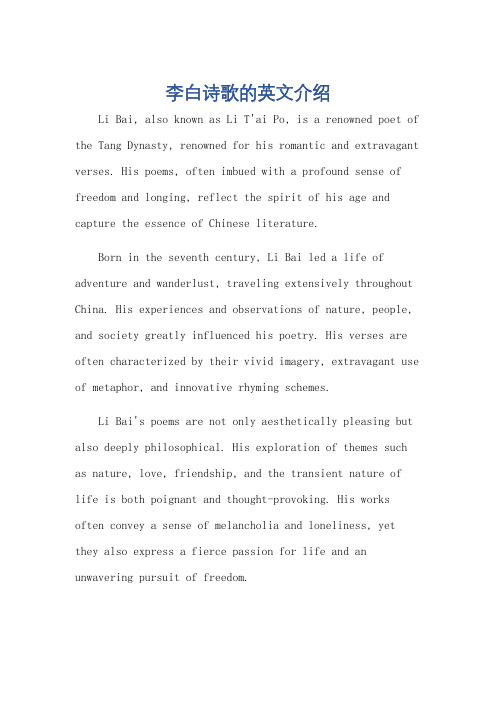
李白诗歌的英文介绍Li Bai, also known as Li T'ai Po, is a renowned poet of the Tang Dynasty, renowned for his romantic and extravagant verses. His poems, often imbued with a profound sense of freedom and longing, reflect the spirit of his age and capture the essence of Chinese literature.Born in the seventh century, Li Bai led a life of adventure and wanderlust, traveling extensively throughout China. His experiences and observations of nature, people, and society greatly influenced his poetry. His verses are often characterized by their vivid imagery, extravagant use of metaphor, and innovative rhyming schemes.Li Bai's poems are not only aesthetically pleasing but also deeply philosophical. His exploration of themes such as nature, love, friendship, and the transient nature of life is both poignant and thought-provoking. His works often convey a sense of melancholia and loneliness, yet they also express a fierce passion for life and an unwavering pursuit of freedom.One of Li Bai's most famous poems, "On a Quiet Night Thoughts," captures the essence of his poetic style. Inthis piece, he muses on the vastness of the universe and the brevity of human life, comparing his own existence to a fleeting guest in the world. The poem is both melancholic and uplifting, reflecting Li Bai's unique ability to capture the complexities of human emotion.Another notable aspect of Li Bai's poetry is his use of alcohol as a source of inspiration. Many of his poems were composed while he was under the influence of liquor, and his drunken state often lent his verses a wild and unrestrained quality. This aspect of his life and work adds to his reputation as a rebellious and unconventional figure in Chinese literary history.In conclusion, Li Bai's poetry stands as a testament to his unique talent and the vibrant culture of the Tang Dynasty. His verses continue to inspire and captivate readers worldwide, serving as a bridge between ancient Chinese literature and modern global culture.**李白诗歌的英文介绍**李白,又称李太白,是唐朝著名的诗人,以其浪漫奔放的诗篇闻名于世。
李白和他的诗歌英语作文中英双语

李白和他的诗歌英语作文中英双语Here is an English essay on Li Bai and his poetry, with the content exceeding 1000 words as requested. The title is included, but there are no additional punctuation marks in the main body of the text.Li Bai and His PoetryLi Bai, also known as Li Po, was one of the most renowned and influential poets in Chinese history. Born in the year 701 CE during the Tang Dynasty, Li Bai's poetry has captivated readers for centuries with its lyrical beauty, vivid imagery, and profound philosophical insights. His works have had a lasting impact not only on Chinese literature but also on the broader cultural landscape of East Asia.Li Bai's poetic genius was recognized early on, and he was celebrated as one of the "Three Perfected Ones" of the Tang Dynasty, along with Du Fu and Wang Wei. His poems often drew inspiration from the natural world, capturing the grandeur of mountains, the serenity of rivers, and the ever-changing seasons. Many of his works also explored themes of Taoism, the ancient Chinese philosophy that emphasizes the harmony between the individual and the natural order.One of Li Bai's most famous poems is "Drinking Alone by Moonlight," which exemplifies his mastery of imagery and metaphor. In this poem, the speaker, who is presumably Li Bai himself, describes a solitary evening spent drinking wine under the light of the moon. The poem is a meditation on the fleeting nature of life and the solace found in the simple pleasures of nature and solitude."Drinking Alone by Moonlight" begins with the lines "Among the flowers, I am alone with my pot of wine, drinking by myself no one to share it with me" which immediately sets the tone of solitude and contemplation. The speaker then goes on to describe the moon as his "guest" and the shadows of the flowers as his "companions," suggesting a deep connection with the natural world around him.The poem also touches on the theme of immortality, with the speaker wondering if the moon will remember him after he is gone. This sense of mortality is balanced by a deep appreciation for the beauty and tranquility of the present moment, as the speaker revels in the simple act of drinking wine under the moonlight.Another of Li Bai's most celebrated works is "Thoughts on a Still Night," which explores the longing for home and the bittersweet nostalgia of the human experience. In this poem, the speaker gazes up at the moon, which reminds him of his distant homeland. Theimagery of the moon and the cool night breeze evoke a sense of melancholy and longing, as the speaker reflects on the passage of time and the fleeting nature of human existence.The poem's final lines are particularly poignant, as the speaker expresses a desire to "join the birds and beasts in their eternal dance" – a metaphor for the transcendence of the human condition and the desire to connect with the natural world on a deeper level.Li Bai's poetry is not only renowned for its artistic merit but also for its philosophical depth. Many of his works grapple with the fundamental questions of human existence, exploring themes of mortality, the nature of the self, and the relationship between the individual and the cosmos.In "Drinking Wine," for example, Li Bai presents a vision of the world that is both deeply personal and profoundly universal. The speaker, who is presumably the poet himself, describes the act of drinking wine as a means of transcending the limitations of the physical world and connecting with the eternal rhythms of the universe.The poem's famous opening lines, "The birds have vanished into the sky, and now the last cloud drains away. We sit together, the mountain and me, until only the mountain remains," exemplify Li Bai's ability to weave together the natural and the metaphysical, theindividual and the cosmic.Throughout his work, Li Bai often invokes the imagery of the natural world – mountains, rivers, and celestial bodies – as a means of exploring the deeper truths of human existence. His poems frequently depict the speaker as a solitary figure, contemplating the mysteries of the universe and seeking to find his place within the grand scheme of things.Li Bai's influence on Chinese literature and culture cannot be overstated. His poems have been studied, memorized, and recited by generations of scholars, artists, and ordinary readers alike. Many of his works have been translated into numerous languages, introducing his poetic genius to audiences around the world.Moreover, Li Bai's legacy extends beyond the realm of poetry itself. His life and persona have become the subject of countless works of art, from paintings and calligraphy to operas and films. He is widely regarded as the quintessential "immortal poet," whose words and images have become woven into the fabric of Chinese cultural identity.In conclusion, Li Bai's poetry stands as a testament to the enduring power of the human imagination and the ability of art to transcend the boundaries of time and space. His works continue to captivateand inspire readers around the world, offering a glimpse into the profound depths of the human experience and the natural world that surrounds us. Through his timeless verses, Li Bai has left an indelible mark on the cultural and literary landscape, ensuring that his legacy will endure for generations to come.。
李白诗床前明月光 疑是地上霜中英文对照

李白诗床前明月光疑是地上霜中英文对照摘要:1.介绍李白的《静夜思》2.对比中英文版本的异同3.分析中英文版本的意境和表达方式4.总结中英文版本的优劣正文:李白的《静夜思》是一首描绘夜晚寂静思念故乡的诗歌,该诗的中英文版本被广泛传颂。
在这篇文章中,我们将对这两个版本进行比较和分析。
首先,让我们来看看《静夜思》的原文:“床前明月光,疑是地上霜。
举头望明月,低头思故乡。
”这首诗通过明亮的月光、地上的霜和故乡的思念,表达了诗人在夜晚的寂静中对故乡的深深眷恋。
接下来,我们来看看英文版本:“The bright moonlight before my bed, seems like frost on the ground.I raise my head to watch the moon, and lower it to think of home.”虽然英文版本保留了原文的意思,但是它缺乏原文的诗意和意境。
在分析中英文版本的意境和表达方式时,我们可以发现中文版本使用了更具有诗意的表达方式。
例如,“疑是地上霜”一句,通过“疑是”一词,使读者在想象中感受到月光的明亮和地上霜的洁白。
而英文版本则直接将“疑是”翻译成了“seems like”,缺乏了这种诗意的表达方式。
此外,中文版本中的“举头望明月,低头思故乡”也更具表现力。
它通过“举头”和“低头”的动作,形象地描绘了诗人对故乡的思念之情。
而英文版本则仅仅使用了“raise my head to watch the moon, and lower it to think of home”的表达方式,没有中文版本来的生动形象。
综上所述,虽然中英文版本都表达了诗人对故乡的思念之情,但是中文版本在表达方式和意境上更具有优势。
李白《望庐山瀑布》英文翻译
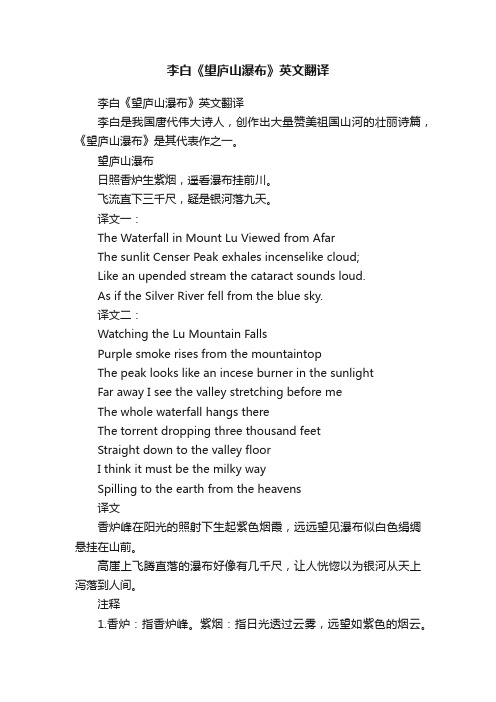
李白《望庐山瀑布》英文翻译李白《望庐山瀑布》英文翻译李白是我国唐代伟大诗人,创作出大量赞美祖国山河的壮丽诗篇,《望庐山瀑布》是其代表作之一。
望庐山瀑布日照香炉生紫烟,遥看瀑布挂前川。
飞流直下三千尺,疑是银河落九天。
译文一:The Waterfall in Mount Lu Viewed from AfarThe sunlit Censer Peak exhales incenselike cloud;Like an upended stream the cataract sounds loud.As if the Silver River fell from the blue sky.译文二:Watching the Lu Mountain FallsPurple smoke rises from the mountaintopThe peak looks like an incese burner in the sunlightFar away I see the valley stretching before meThe whole waterfall hangs thereThe torrent dropping three thousand feetStraight down to the valley floorI think it must be the milky waySpilling to the earth from the heavens译文香炉峰在阳光的照射下生起紫色烟霞,远远望见瀑布似白色绢绸悬挂在山前。
高崖上飞腾直落的瀑布好像有几千尺,让人恍惚以为银河从天上泻落到人间。
注释1.香炉:指香炉峰。
紫烟:指日光透过云雾,远望如紫色的烟云。
孟浩然《彭蠡湖中望庐山》:“香炉初上日,瀑布喷成虹。
”“日照”二句:一作“庐山上与星斗连,日照香炉生紫烟”。
2.遥看:从远处看。
挂:悬挂。
《将进酒》标准英文版翻译
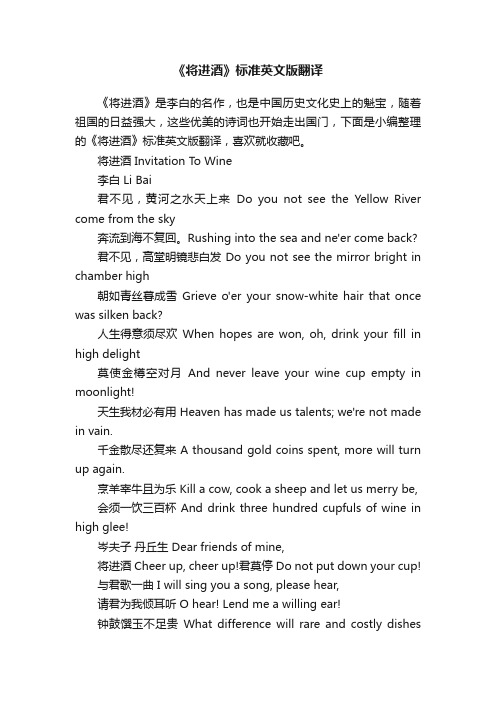
《将进酒》标准英文版翻译《将进酒》是李白的名作,也是中国历史文化史上的魁宝,随着祖国的日益强大,这些优美的诗词也开始走出国门,下面是小编整理的《将进酒》标准英文版翻译,喜欢就收藏吧。
将进酒 Invitation T o Wine李白 Li Bai君不见,黄河之水天上来Do you not see the Yellow River come from the sky奔流到海不复回。
Rushing into the sea and ne'er come back?君不见,高堂明镜悲白发 Do you not see the mirror bright in chamber high朝如青丝暮成雪Grieve o'er your snow-white hair that once was silken back?人生得意须尽欢When hopes are won, oh, drink your fill in high delight莫使金樽空对月And never leave your wine cup empty in moonlight!天生我材必有用 Heaven has made us talents; we're not made in vain.千金散尽还复来 A thousand gold coins spent, more will turn up again.烹羊宰牛且为乐 Kill a cow, cook a sheep and let us merry be, 会须一饮三百杯 And drink three hundred cupfuls of wine in high glee!岑夫子丹丘生 Dear friends of mine,将进酒 Cheer up, cheer up!君莫停 Do not put down your cup!与君歌一曲 I will sing you a song, please hear,请君为我倾耳听 O hear! Lend me a willing ear!钟鼓馔玉不足贵What difference will rare and costly dishesmake但愿长醉不愿醒 I want only to get drunk and ne'er to wake.古来圣贤皆寂寞 How many great men were forgotten through the ages?惟有饮者留其名 Great drinkers are better known than sober sages.陈王昔时宴平乐 The Prince of Poets* feasted in his palace at will,斗酒十千恣欢谑 Drank wine at ten thousand coins a cask and laughed his fill.主人何为言少钱 A host should not complain of money he is short;径须沽取对君酌 T o drink together we'd sell things of any sort.五花马千金裘 The fur coat worth a thousand coins of gold呼儿将出换美酒 And flower-dappled horse may both be sold 与尔同消万古愁To buy good wine that we may drown the woes age-old.拓展:原文:将进酒朝代:唐朝作者:李白君不见,黄河之水天上来,奔流到海不复回。
李白和他的诗歌英语作文中英双语

李白和他的诗歌英语作文中英双语Li Bai and His PoetryHave you ever heard of a poet named Li Bai? He was one of the greatest poets in ancient China, and his poems are still loved by people all over the world today!Li Bai was born in the year 701 in what is now Sichuan Province, China. He came from a humble family, but he loved learning and studying from a very young age. Even as a child, Li Bai was fascinated by nature and the beauty of the world around him.When Li Bai grew up, he traveled all around China. He explored mountains, rivers, and forests, and he was inspired by the amazing sights he saw. Li Bai also liked to have fun and enjoy life. He loved drinking wine with his friends and celebrating under the moon and stars.Wherever Li Bai went, he wrote beautiful poems. His poems captured the magic of nature and the simple joys of life. People were amazed by how perfectly his words painted pictures in their minds.One of Li Bai's most famous poems is called "Quiet Night Thought." Here is that poem in English:Before my bed, there is bright moonlightSo that it seems like frost on the floor;I raise my head and gaze at the bright moon,Then lower it, thinking of my old home.Isn't that a lovely poem? Let me explain it to you. In the poem, Li Bai is lying in bed at night, looking at the bright moonlight shining through his window. The moonlight is so bright that it looks like frost on the floor. When Li Bai raises his head, he sees the beautiful moon. But then he lowers his head and feels sad, because the moon reminds him of his old home far away.Another one of Li Bai's most famous poems is "Drinking Alone by Moonlight." This poem describes the poet drinking wine by himself, while the moon shines down on him and his shadow keeps him company. Li Bai felt a deep connection to nature, and the moon was very special to him.Here are a few more lines from Li Bai's poems that show his love for nature:"The flowers are drunk withFragrance from the winding streams""Golden winds blow, blowing my thoughts awry""In the deep branches of red blossoms, a birdcall echoes, echoes"Don't those make you want to go outside and experience the beauty of the natural world? Li Bai had a way of bringing the outdoors to life with his words.Li Bai lived a very interesting life. He traveled all over China and even visited other countries. He became a well-known and respected poet. But he never lost his sense of wonder at the simple pleasures of nature, friendship, and good wine.Even though Li Bai lived over 1,300 years ago, his poetry still speaks to people today. His words remind us to slow down, appreciate the beauty around us, and enjoy the little things in life. No matter how much time passes, Li Bai's meaningful poems will continue to touch people's hearts.The next time you gaze at the moon or smell some fragrant flowers, think of Li Bai. He showed us how to find magic and joy in the natural world through his brilliant poetry. Li Bai was truly a word artist who painted pictures that will last forever.李白和他的诗歌你听说过一个叫李白的诗人吗?他是古代中国最伟大的诗人之一,他的诗作至今仍深受世界各地人们的喜爱!李白于701年出生于今四川省,家境贫寒。
李白诗词英文翻译及讲解共32页文档
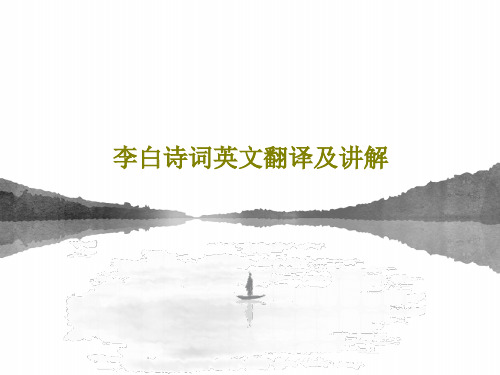
1、战鼓一响,法律无声。——英国 2、任何法律的根本;不,不成文法本 身就是 讲道理 ……法 律,也 ----即 明示道 理。— —爱·科 克
3、法律是最保险的头盔。——爱·科 克 4、一个国家如果纲纪不正,其国风一 定颓败 。—— 塞内加 5、法律不能使人人平等,但是在法律 面前人 人是平 等的。 —自命不凡。——邓拓 12、越是无能的人,越喜欢挑剔别人的错儿。——爱尔兰 13、知人者智,自知者明。胜人者有力,自胜者强。——老子 14、意志坚强的人能把世界放在手中像泥块一样任意揉捏。——歌德 15、最具挑战性的挑战莫过于提升自我。——迈克尔·F·斯特利
李白的诗早发白帝城英语译名

李白的诗早发白帝城英语译名The Poetry of Li Bai: An Early Departure from the White Emperor CityLi Bai, the renowned Tang Dynasty poet, is renowned for his captivating and evocative verses that have transcended the boundaries of time and space. One of his most celebrated works, "Early Departure from the White Emperor City," stands as a testament to his poetic genius and the profound depth of his artistic expression.The poem, composed during Li Bai's travels, reflects the poet's introspective journey and the bittersweet emotions that accompany the act of departure. The White Emperor City, situated along the Yangtze River, served as a significant backdrop for this masterpiece, imbuing the verses with a sense of grandeur and melancholy.The opening lines of the poem immediately captivate the reader with their vivid imagery "The monkeys howl mournfully at the White Emperor City as I depart on my journey" Li Bai's use of personification, imbuing the monkeys with a sense of sorrow, sets the tone for the emotional journey that is to unfold. The reader is transported to the banks of the Yangtze, where the poet stands,bidding farewell to the familiar surroundings.As the poem progresses, Li Bai's mastery of language becomes increasingly evident. The lines "The river flows swiftly, the water surging and foaming, as if it too is in a hurry to leave" evoke a sense of urgency and movement, mirroring the poet's own desire to embark on his journey. The personification of the river, imbued with a sense of haste, reinforces the emotional turmoil that Li Bai is experiencing.The imagery employed by Li Bai is not merely descriptive but also deeply symbolic. The "White Emperor City," with its towering cliffs and majestic presence, serves as a metaphor for the transient nature of human existence. As the poet departs, he is forced to confront the fleeting nature of life and the inevitability of change.The final stanza of the poem is particularly poignant, as Li Bai reflects on the bittersweet nature of his departure "My heart is heavy with sorrow, yet my spirit soars with the knowledge that I am embarking on a new journey" The juxtaposition of sorrow and optimism, of the weight of leaving and the promise of the unknown, captures the essence of the human experience.Throughout the poem, Li Bai's mastery of language is evident in his skillful use of metaphor, imagery, and rhythm. The flowing cadenceof the verses, coupled with the vivid descriptions, transport the reader into the poet's world, allowing them to share in the emotional journey.Beyond the surface-level interpretation, "Early Departure from the White Emperor City" can be seen as a reflection on the broader human condition. The poem speaks to the universal themes of change, mortality, and the search for meaning in a world that is constantly in flux. Li Bai's words resonate across time and culture, touching the hearts and minds of readers who seek to understand the complexities of the human experience.In conclusion, Li Bai's "Early Departure from the White Emperor City" stands as a masterpiece of Chinese poetry, a testament to the power of language to convey the depth of human emotion and the profound mysteries of the universe. Through his evocative imagery and poignant reflections, the poet has left an indelible mark on the literary landscape, inspiring generations of readers and writers to explore the boundless possibilities of the written word.。
唐代诗人李白诗歌英文

Can you guess the Chinese name of this poem?
· My friend has left the west where the Yellow Crane towers; · For River Town green with willows and red with flowers. · His lessening sail is lost in the boundless blue sky; · Where I see but the endless River rolling by.
三、Poetry(歌行)
Taking subjected emotion and intention as the dexis to unfold the article, false alternate with true 《梦游天姥吟留别》 《把酒问月》
“安能摧眉折腰事权贵, “青天有月来几时? 使我不得开心颜· · · · · · ” 我今停杯一问之。 人攀明月不可得, 月行却与人相随· · · · · · ”
The Classification of the Li Bai's Poem
1、Eulogize the mountains and rivers 《望庐山瀑布》Watching The Lu Mountain Falls 《望天门山》Look at Mount Tianmen
2、The countryside friendship 《赠汪伦》To Wang Lun 《静夜思》A Tranquil Night
Poetic Genius
------Li Bai
A Tranquil Night Abed, I see a silver light, I wonder if it's frost aground. Looking up, I find the moon bright; Bowing, in homesickness I'm drowned.
李白的诗英文版诗歌精选

李白的诗英文版诗歌精选(最新版)编制人:__________________审核人:__________________审批人:__________________编制单位:__________________编制时间:____年____月____日序言下载提示:该文档是本店铺精心编制而成的,希望大家下载后,能够帮助大家解决实际问题。
文档下载后可定制修改,请根据实际需要进行调整和使用,谢谢!并且,本店铺为大家提供各种类型的经典范文,如诗词歌赋、教学资料、作文大全、总结计划、党团报告、活动方案、制度手册、名言警句、祝福语、其他范文等等,想了解不同范文格式和写法,敬请关注!Download tips: This document is carefully compiled by this editor.I hope that after you download it, it can help you solve practical problems. The document can be customized and modified after downloading, please adjust and use it according to actual needs, thank you!In addition, this shop provides you with various types of classic sample essays, such as poems and songs, teaching materials, essays, summary plans, party reports, activity plans, system manuals, famous sayings, blessings, other sample essays, etc., I want to know Please pay attention to the different format and writing styles of sample essays!李白的诗英文版诗歌精选唐诗的形式是多种多样的。
李白诗词英文翻译及讲解
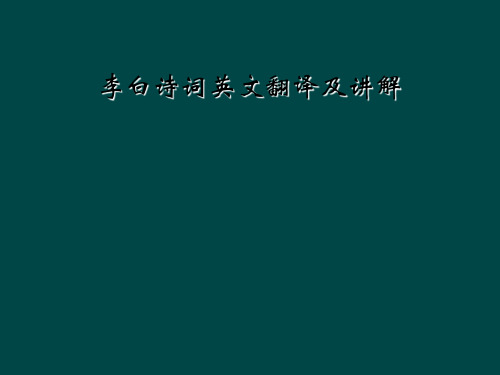
You dragged your feet when you went out. By the gate now, the moss is grown, the different mosses, Too deep to clear them away! The leaves fall early this autumn, in wind. The paired butterflies are already yellow with August Over the grass in the West garden; They hurt me. I grow older.
lyrics from traditional folk ballads. 建安七子、陈思王、 谢
朓
2. Rapt with wine and moon:
John C. H. Wu observed that “while some may have drunk more wine than Li [Bai], no-one has written more poems about wine.“ “the Eight Immortals”,《春日醉起言 志》、《月下独酌》、
花间一壶酒,独酌无相亲。 举杯邀明月,对影成三人。 月既不解饮,影徒随我身。 暂伴月将影,行乐须及春。 我歌月徘徊,我舞影零乱。 醒时同交欢,醉后各分散。 永结无情游,相期邈云汉。
李白诗英语版
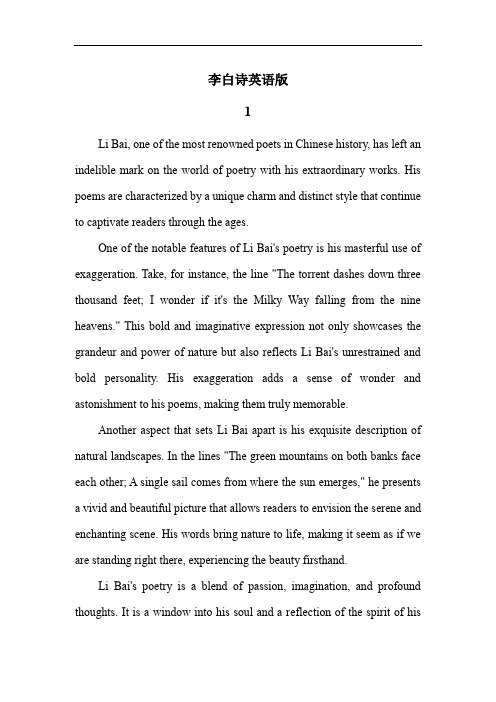
李白诗英语版1Li Bai, one of the most renowned poets in Chinese history, has left an indelible mark on the world of poetry with his extraordinary works. His poems are characterized by a unique charm and distinct style that continue to captivate readers through the ages.One of the notable features of Li Bai's poetry is his masterful use of exaggeration. Take, for instance, the line "The torrent dashes down three thousand feet; I wonder if it's the Milky Way falling from the nine heavens." This bold and imaginative expression not only showcases the grandeur and power of nature but also reflects Li Bai's unrestrained and bold personality. His exaggeration adds a sense of wonder and astonishment to his poems, making them truly memorable.Another aspect that sets Li Bai apart is his exquisite description of natural landscapes. In the lines "The green mountains on both banks face each other; A single sail comes from where the sun emerges," he presents a vivid and beautiful picture that allows readers to envision the serene and enchanting scene. His words bring nature to life, making it seem as if we are standing right there, experiencing the beauty firsthand.Li Bai's poetry is a blend of passion, imagination, and profound thoughts. It is a window into his soul and a reflection of the spirit of histime. His works continue to inspire and touch the hearts of people, transcending boundaries of time and space, and remaining as a precious treasure in the realm of literature.2Li Bai, one of the most renowned poets in Chinese history, has left a profound and lasting impression on the world of literature with his magnificent verses. His poems are like precious jewels, each one radiating a unique charm and emotion.Take the line "Raising my head, I look at the bright moon; bowing my head, I am thinking of home." This simple yet powerful expression conveys a deep longing for one's hometown. The contrast between looking up at the moon and lowering one's head in thought evokes a poignant sense of nostalgia and the yearning for the familiar.Another example is "Since heaven gave the talent, let it be employed! Spin a thousand pieces of silver, all of them come back!" Here, Li Bai showcases an unwavering confidence and a magnanimous attitude. It reflects his belief in his own worth and the idea that material wealth is of no consequence compared to one's inner potential and spirit.Li Bai's poetry is not only a manifestation of his personal emotions but also a mirror that reflects the human experience of various sentiments. His words have the power to touch our hearts and make us resonate with the universal emotions he expressed, transcending time and space. Throughhis poems, we can gain a deeper understanding of life, emotions, and the beauty of the world.3Li Bai, one of the most renowned poets in Chinese history, has left an indelible mark on the literary landscape. His poems have had a profound and far-reaching influence on subsequent generations.Li Bai's poetry was a driving force in the development of ancient Chinese literature. His bold and unrestrained style, combined with his vivid and imaginative expressions, broke through traditional literary norms. Take, for instance, his poem "Invitation to Wine", where he depicts the joy and freedom of life with such passion and vigor. This innovative approach inspired countless poets to explore new ways of expressing their thoughts and emotions.In modern society, Li Bai's poems remain of great significance for cultural inheritance. They serve as a bridge connecting the past and the present, allowing us to appreciate the wisdom and beauty of ancient culture. His works are widely taught in schools, nurturing the literary taste and aesthetic sense of young people. Moreover, they have been adapted into various art forms, such as music and paintings, spreading Chinese culture to a wider audience worldwide.In conclusion, Li Bai's poetry is not only a precious heritage of the past but also a source of inspiration for the present and future. It continuesto enrich our spiritual world and promote the development and dissemination of Chinese culture.4Li Bai, one of the most renowned poets in Chinese history, created poems that have captivated readers for centuries. His poetry was deeply influenced by the various stages of his life.In his early years, filled with enthusiasm and ambition, he aspired to achieve great success in the officialdom. However, his hopes were dashed when he encountered numerous obstacles and setbacks. This frustration led him to pen works expressing his discontent and indignation.During his wanderings and travels, he was exposed to the beauty and diversity of nature. The magnificent landscapes and the people he met along the way became inspirations for his lyrical and descriptive verses.When he faced personal losses and hardships, his poems took on a tone of melancholy and reflection. They reflected his inner struggles and the search for meaning and solace.Li Bai's poetry is not merely a collection of words but a mirror that reflects his complex emotions and profound thoughts. It is a testament to his resilience and the power of art to transform life's experiences into timeless masterpieces. His works continue to inspire and touch the hearts of people from all walks of life, transcending time and boundaries.5Li Bai, one of the most renowned poets in Chinese history, has left an indelible mark on the world of poetry. His works have traveled through time and space, captivating hearts and minds across generations.During the Tang Dynasty, when Li Bai composed his masterpieces, they were widely appreciated among the literati and common folk alike. His verses, filled with bold imagination and profound emotions, became the talk of the town and were passed down through oral traditions and written records.As time went by, in subsequent dynasties such as the Song and Yuan, Li Bai's poetry continued to thrive. Scholars studied and analyzed his works, drawing inspiration and seeking wisdom from his words. The styles and themes of his poems influenced many poets of those times, leading to new interpretations and developments.Not only within China, but Li Bai's poetry has also made waves abroad. In countries like Japan and Korea, his works have been translated and studied, appreciated for their universal appeal and artistic value. Western scholars, too, have been drawn to the charm of his verses, marveling at the depth and beauty of his expressions.Today, in the modern era, Li Bai's poetry remains an integral part of Chinese cultural heritage. It is taught in schools, recited in cultural events, and serves as a source of pride for the nation. The timeless appeal of hiswords continues to inspire people of all ages and backgrounds, transcending boundaries and languages.。
- 1、下载文档前请自行甄别文档内容的完整性,平台不提供额外的编辑、内容补充、找答案等附加服务。
- 2、"仅部分预览"的文档,不可在线预览部分如存在完整性等问题,可反馈申请退款(可完整预览的文档不适用该条件!)。
- 3、如文档侵犯您的权益,请联系客服反馈,我们会尽快为您处理(人工客服工作时间:9:00-18:30)。
【篇一】李白诗歌英文翻译
李白
赠孟浩然
吾爱孟夫子,风流天下闻。
红颜弃轩冕,白首卧松云。
醉月频中圣,迷花不事君。
高山安可仰? 徒此挹清芬。
Five-character-regular-verse
Li Bai
A MESSAGE TO MENG HAORAN
Master, I hail you from my heart,
And your fame arisen to the skies....
Renouncing in ruddy youth the importance of hat and chariot, You chose pine-trees and clouds; and now, whitehaired, Drunk with the moon, a sage of dreams,
Flower- bewitched, you are deaf to the Emperor....
High mountain, how I long to reach you,
Breathing your sweetness even here!
【篇二】李白诗歌英文翻译
李白
渡荆门送别
渡远荆门外,来从楚国游。
山随平野尽,江入大荒流。
月下飞天镜,云生结海楼。
仍怜故乡水,万里送行舟。
Five-character-regular-verse
Li Bai
BIDDING A FRIEND FAREWELL AT JINGMEN FERRY Sailing far off from Jingmen Ferry,
Soon you will be with people in the south, Where the mountains end and the plains begin And the river winds through wilderness.... The moon is lifted like a mirror,
Sea-clouds gleam like palaces,
And the water has brought you a touch of home To draw your boat three hundred miles.
【篇三】李白诗歌英文翻译
李白
送友人
青山横北郭,白水绕东城。
此地一为别,孤蓬万里征。
浮云游子意,落日故人情。
挥手自兹去,萧萧班马鸣。
Five-character-regular-verse
Li Bai
A FAREWELL TO A FRIEND
With a blue line of mountains north of the wall, And east of the city a white curve of water, Here you must leave me and drift away
Like a loosened water-plant hundreds of miles....
I shall think of you in a floating cloud;
So in the sunset think of me.
...We wave our hands to say good-bye,
And my horse is neighing again and again.。
